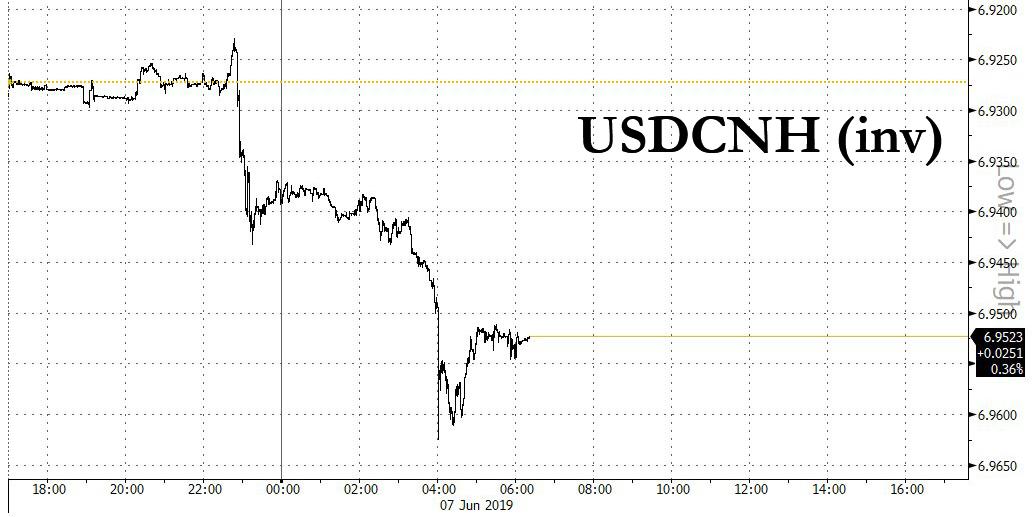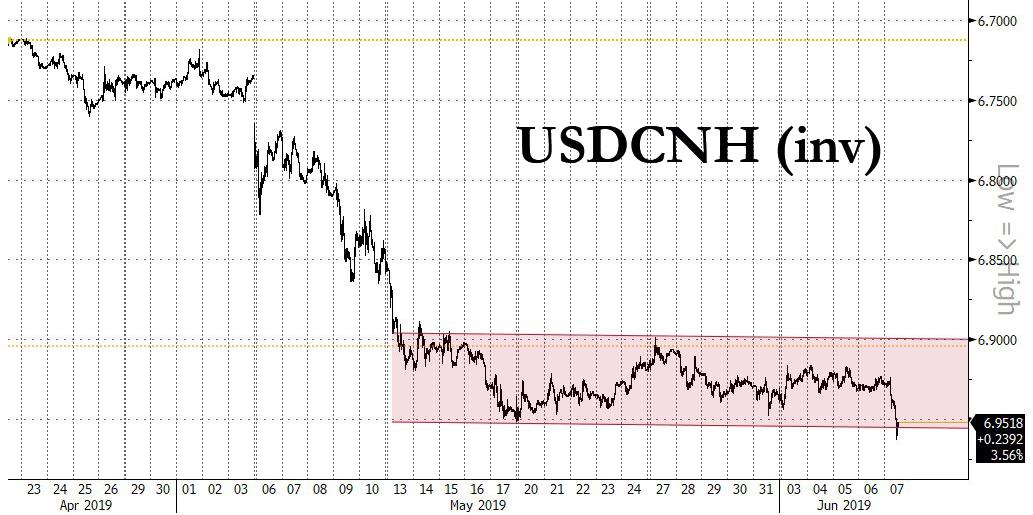via Zerohedge:
After a period of unnatural stability, in which the offshore Yuan traded in a tight range of 6.90 and 6.95 since May 13 the Yuan finally broke out of the channel and tumbled 0.5%, the most in three weeks to at low as 6.9625 vs the dollar, the lowest level since November 2018, after the chief of China’s central bank said Beijing has “tremendous” room to adjust monetary policy if the trade war with the U.S. deepens, and hinted there’s no line in the sand for the currency, meaning the key “psychological” level of 7 does not exist in times of trade war.
The yuan had stabilized in recent weeks as authorities voiced support for the currency, following a rout in early May that pushed it near 7 per dollar level not breached since the global financial crisis. It still lost about 2.5% in May, among the worst in Asia.
“We have plenty of room in interest rates, we have plenty of room in required reserve ratio rate, and also for the fiscal, monetary policy toolkit, I think the room for adjustment is tremendous,” PBOC governor Yi Gang in an interview with Bloomberg in Beijing.
When asked if his upcoming meeting with Steven Mnuchin this weekend would get negotiations with the U.S. back on track, Yi said it would probably be a “productive talk, as always,” though the topic of the trade war would be “uncertain and difficult.” The two are scheduled to meet on the sidelines of the G-20 meeting in Japan. This is the first publicly announced meeting since the trade talks fell apart last month and could pave the way for a meeting between Presidents Donald Trump and Xi Jinping, who will likely be in Japan at the end of the month for the G-20 leaders’ summit.
Commenting on the recent yuan move, Yi said that “recently, it’s a little bit weaker, because the tremendous pressure from the U.S. side.” When asked if there’s a red line for the exchange rate, Yi said no number is more important than another.
That was all FX traders needed to hear to start selling the yuan: “this is a hint that China may allow the yuan to break 7 if the trade war escalates, and Yi is seeking to prepare and guide the market,” said Gao Qi, a currency strategist at Scotiabank in Singapore. “It’s possible that the yuan may breach that level if the trade talks collapse.”
Not possible – guaranteed. Even Yi refused to outright deny that trade war could lead to devaluation:
“The trade war would have a temporary depreciation pressure on renminbi, but you see, after the noise, renminbi will continue to be very stable and relatively strong compared to emerging market currencies, even compared to convertible currencies,” Yi said, using the yuan’s official name. “I’m very confident renminbi will continue to be stable at a more or less equilibrium level.”
He then said that “a little bit of flexibility of renminbi is good for the Chinese economy and for the global economy because it provides an automatic stabilizer for the economy,” adding that “the central bank of China is pretty much not intervening in the foreign-exchange market for a long time, and I hope that this situation will continue, not intervening.”
A growing number of economists predict that the worsening trade war and job market outlook could prompt the central bank to take bolder easing steps.
“Looking forward, our base case is that an escalating trade war will push key gauges below the PBOC’s tolerance threshold, triggering 50 basis points of rate cuts and another 150-200 bps of reserve requirement cuts by year-end,” David Qu, an economist with Bloomberg Economics in Hong Kong, wrote in a recent report. That would most likely send the yuan below 7.00 for the first time in years and provoke a furious response from the White House.
In his Bloomberg interview, Yi gave no indication that the government was considering more fiscal stimulus now to counteract the effect of the trade war.
“Our fiscal policy this year is probably the largest and strongest fiscal reform package, in terms of the tax cuts, and also in terms of having more efficient fiscal resources allocation between the central government and the local government,” Yi said. “The current package is able to cover the cases where the situation is getting a little bit worse, but of course, if the situation gets tremendously worse, they will open the discussion. But right now they haven’t discussed that scenario yet.”
Discussing the plunge in the yuan, Bloomberg’s Benjamin Dow writes this morning that “Yi’s failure to set a red line is rightly scaring money out of the CNH, but it should come as no surprise. 7/$ was already in view back in 1Q before the market became overly optimistic about a U.S.-China trade deal, and little has changed since then.” He then explains China’s strategy in terms of the Russian response to Western sanctions:
The calculus the PBOC and other policymakers can employ is redolent of what the Russian government did earlier this decade amid the oil crash and Western sanctions — let the ruble slide to help exports, and also stretch forex reserves that come from dollar-priced commodities and energy sales. China’s forex pile in the form of U.S. Treasuries and other reserves play a similar role for Beijing, and that means a chance for weaker local currency in order to stretch that stimulus.
And so with China one step closer to allowing the yuan to slide below 7, one can be sure it won’t go unnoticed by the White House, BBG’s Richard Jones writes. And, “as much as the U.S. administration has been waging war by using tariffs, don’t be surprised if the White House starts trying to jawbone the USD lower too.”

